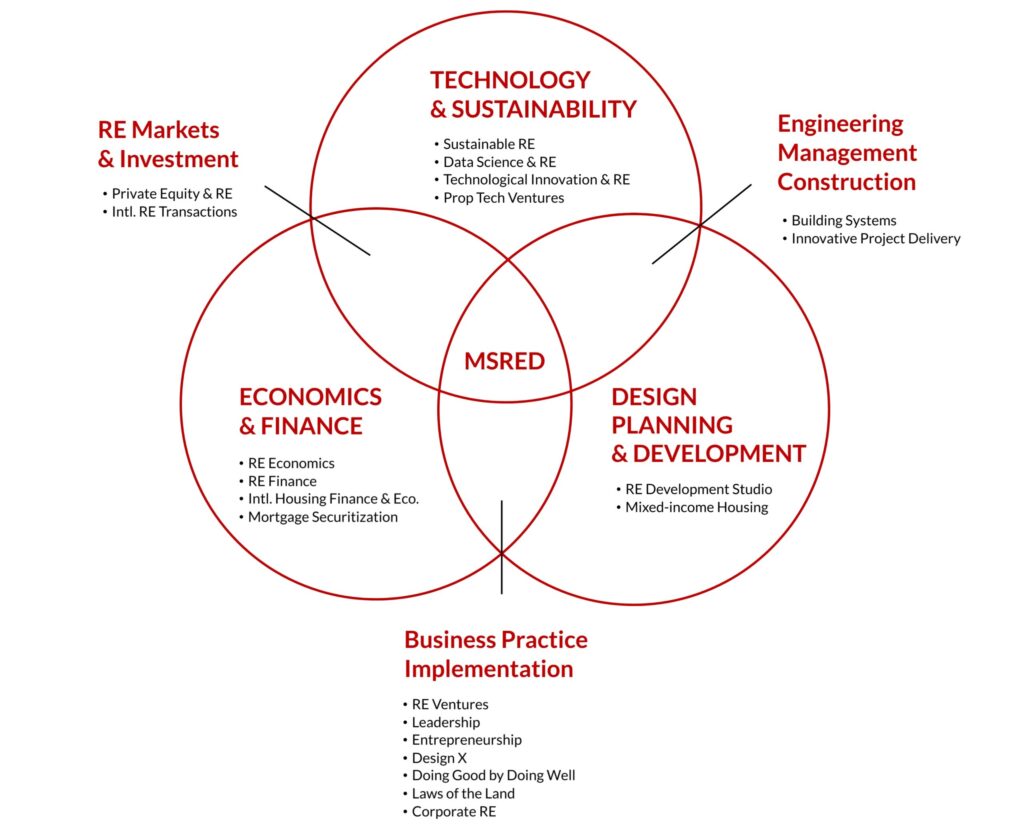Degree Requirements and Curriculum

The Master of Science in Real Estate Development (MSRED) students must complete a set of required core courses and meet a specific number of graduate credits to complete their degree requirements.
To be eligible for their degree, MSRED students must maintain a 4.0 out of 5.0 GPA and complete six core courses and defend a thesis. In addition, students must take one to two electives per term, totaling six to eight electives during their time at MIT.
The MSRED Degree Requirements chart is a helpful guide for course planning.
Required Units
Core Courses – 60 Units
Electives – 39 Units (24 Units from CRE Electives list)
Thesis – 12 Units
Total – 111 Units
Visit the MIT Bulletin to see individual course descriptions
Students must successfully complete the specified MSRED core courses:
11.303: Real Estate Development Studio (18 units)
11.350: Sustainable Real Estate (12 units)
11.431: Real Estate Finance and Investment (12 units)
11.433: Real Estate Economics (12 units)
11.450: Real Estate Building Systems (3 units)
11.499: Thesis Prep (3 units)
The above course are letter graded. They can not be taken P/F
Click here for Course Descriptions
Students can choose from a variety of elective and seminar courses throughout MIT or at Harvard through the MIT/Harvard cross-registration program.
Students must take a minimum of 24 units from the CRE Elective Course List. At least six of those 24 units must be taken in both fall and spring. The remaining units can be fulfilled from the Seminars and Electives courses as well as from courses across MIT.
International students may be required to take an English course during the first semester at MIT. Please be aware of the Center for Real Estate’s MSRED EET POLICY
Fall Semester CRE Elective List*
A minimum of six units from the following courses must be taken in the fall semester.
11.301: Introduction to Urban Design and Development (12 units)
11.305: Doing Good by Doing Well: Planning and Development Case Studies that Promote both the Public Good and Real Estate Value (3 units)
11.325: Technological Change & Innovation for Real Estate + Cities (6 units)
11.345: Entrepreneurship in in the Built Environment (6 units)
11.351: Real Estate Ventures I: Negotiating Development-Phase Agreements (12 units)
11.430: Leadership in Real Estate (6 units)
15.401: Managerial Finance (9 units)
11.S966: Mixed Income and Affordable Housing Policy and Finance (6 units)
Spring Semester CRE Elective List*
A minimum of six units from the following courses must be taken in the spring semester.
11.246: DesignX Accelerator (12 units)
11.321: Data Science & Real Estate (12 units)
11.323: International Real Estate Transactions (6 units)
11.333: Urban Design Seminar: Perspectives on Contemporary Practice (9 units)
11.344: Innovative Project Delivery n the Public and Private Sectors (6 units)
11.352: Real Estate Ventures II: Negotiating Leases, Financings, and Restructurings (12 units)
11.353: Securitization of Mortgages and Other Assets (6 units)
11.355: International Housing Finance & Economics (9 units)
11.429: Real Estate Markets: Macroeconomics (6 units)
11.435: Mixed Income Housing Development (6 units)
The above course are letter graded. They can not be taken P/F unless the course itself is structured that way.
Visit the MIT Bulletin to see individual course descriptions
11.962: Fieldwork – Real Estate (1-3 units)
11.268: Laws of the Land: Property, Land Use & Environmental Law for RED (3 units)
11.428: PropTech Ventures (6 units)
11.S940: Economic Analysis of Urban Development & Environment (12 units)
11.S965: Corporate Real Estate (3 units)
In additional to the above courses, the Center for Real Estate runs Special Topics courses that focus on a wide variety of topics.
RED.THG: Thesis (12 units)
Thesis provides students with an opportunity to integrate and apply the knowledge acquired in course work in a substantial written report, equivalent in academic load to a full course.
Students may choose to collaborate with ongoing faculty or industry-proposed research projects or to identify a topic of their own. Students must be registered when they are working on their thesis.
Theses are letter graded and cannot be taken P/F.
Thesis seminar (course 11.499) is a core course offered each spring term. Thesis seminar describes faculty research interests and explains quantitative and qualitative research methodologies to help students explore possible thesis topics. Student thesis topics and work plans are finalized by the end of the spring term.
Thesis research — which may include interviews, statistical analysis, project evaluations, and literature reviews — and the writing of the thesis is accomplished over the summer term or following fall term.
MSRED students may choose to apply their knowledge and skills with an industry internship. Internships count the experience towards their degree requirements (Fieldwork 11.929). Internships are undertaken during the summer semester, typically by those students pursuing the 16-month program option. Students are required to submit a written summary and assessment of their internship in order to receive credit for this Fieldwork course.
Dual Degree
A student who wants to complement the MSRED with another MIT graduate degree may apply to pursue a dual degree, provided they are accepted for admission and complete degree requirements in each department or School. Learn More About the Dual Degree Application Process
Common Dual Degrees for MSRED Students
- MSRED/Master of City Planning, Department of Urban Studies + Planning, SA+P
- MSRED/M.ARCH, Department of Architecture, SA+P
- MSRED/SMArchS, Department of Architecture, SA+P
Doctor of Philosophy with Real Estate Focus
The CRE offers mentorship and support for DUSP doctoral students focused on real estate studies. The DUSP program is tailored to the needs of individual students, each of whom works closely with a custom ecosystem of scholars. Learn more about PhD programs
